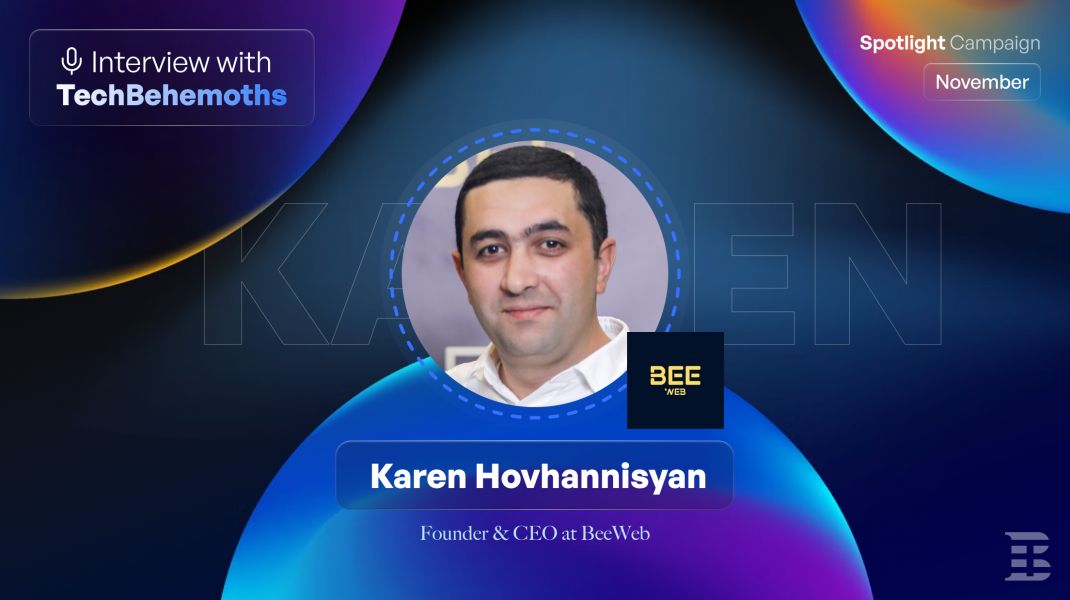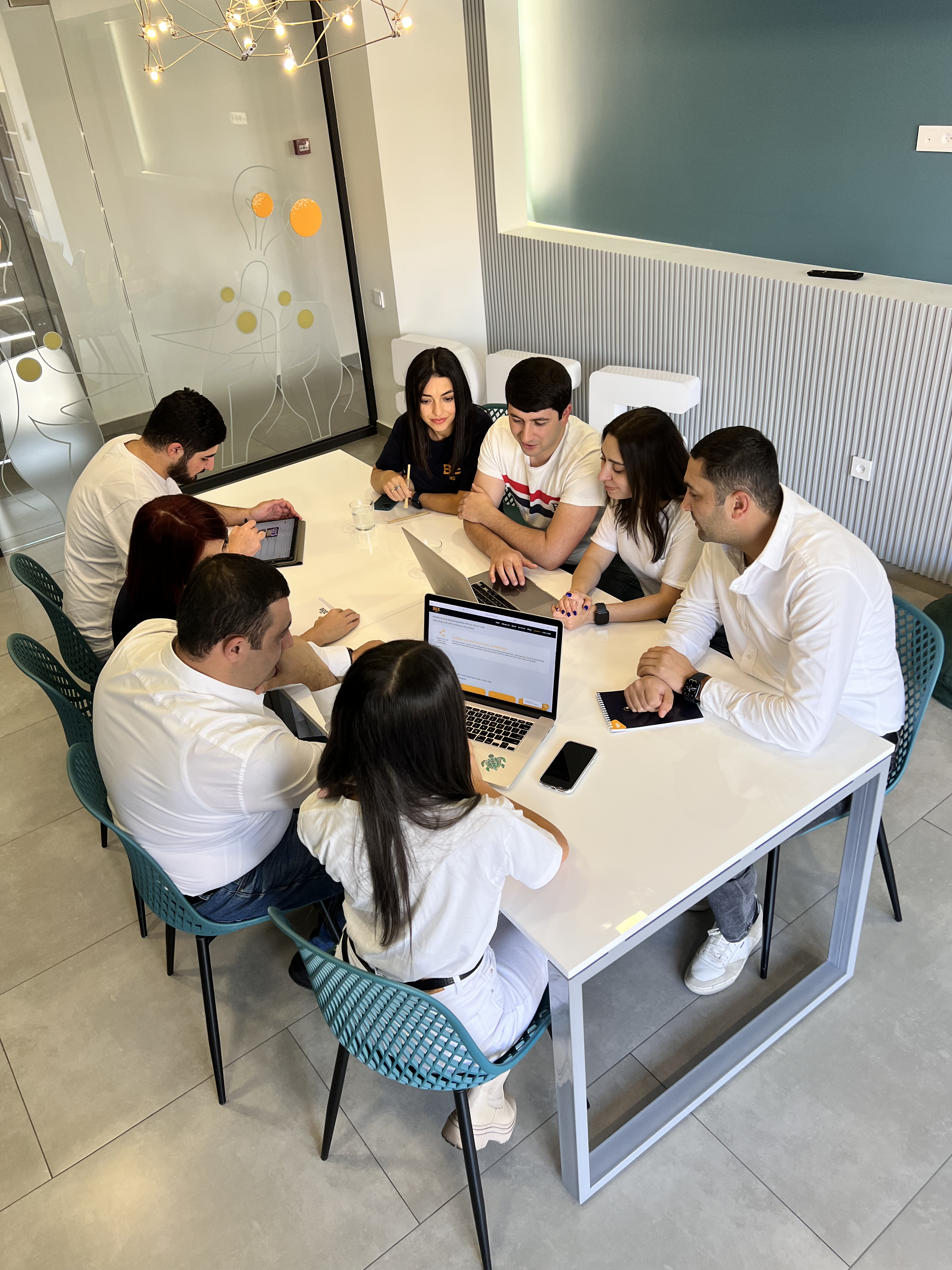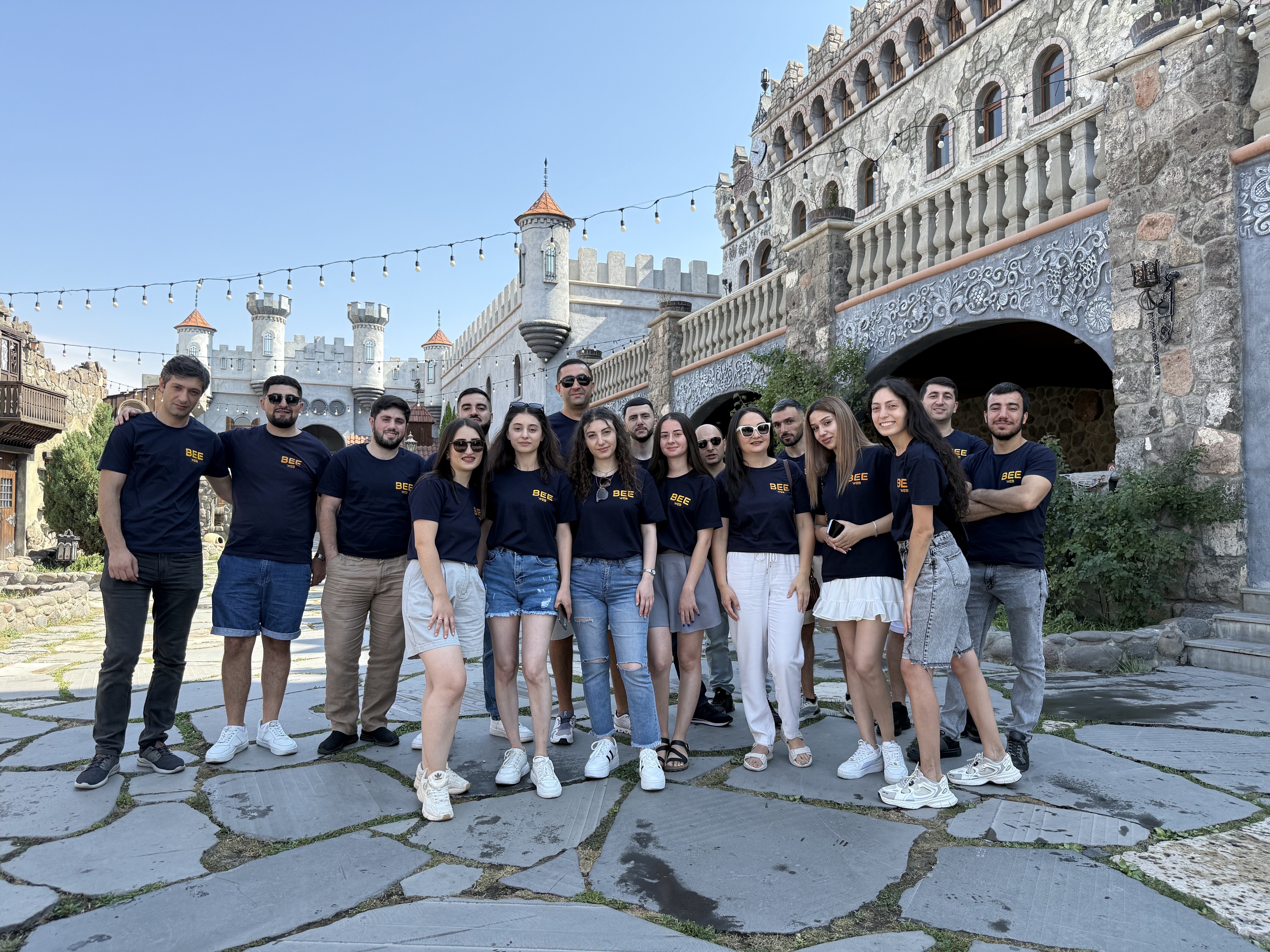Interview with Karen Hovhannisyan, Founder & CEO at BeeWeb

Summary
From curiosity and precision to leadership and innovation, Karen Hovhannisyan, CEO & Co-Founder of BeeWeb, has spent over 15 years helping 100+ businesses grow through technology.
In this interview, he reflects on BeeWeb’s evolution, the values behind its success, and how real innovation goes beyond following trends.
With more than 15 years of experience in software development, Karen has helped over 100 businesses succeed by building digital solutions that drive growth.
Under his leadership, BeeWeb has become a trusted global partner, delivering everything from MVPs to enterprise-grade platforms.
Passionate about innovation, Karen combines technical expertise in JavaScript frameworks with a clear vision for how technology can transform business.
Thanks for joining us, Karen!
To set the mood, please tell us about yourself - your childhood, education, and how your journey in software development began, and what inspired you to co-found BeeWeb?
I was born in Sevan, a small city in Armenia beside a beautiful lake. Growing up there I used to spend a lot of time sitting by the shore and counting things - the fish in the water, the seagulls above me, even the colorful stones I’d collect in my hands. It made me curious and aware of the little details around me.
Looking back, I realize those moments were my first introduction to patterns, sequences, and the kind of systematic thinking that would later define my career. That natural curiosity about numbers and order eventually evolved into a deep love for mathematics and logic, which made my path to programming. I pursued this interest academically, studying Informatics and Applied Mathematics for my Bachelor's degree, then deepening my expertise with a Master’s Degree in Information Technology.
When I entered the IT field, I started as a developer and gradually grew into leadership roles. Eventually, I became a team lead and the main point of contact with clients which taught me that software development is a lot more than writing quality code - it's about understanding people, managing expectations and delivering real value.
All of these experiences came together and pushed me toward entrepreneurship. Almost 11 years ago, I took the leap and founded BeeWeb with this vision in mind: to put Armenia on the map as a destination for high quality software development. I had the vision, and my co-founder Narek had the strong determination to make it real. Looking back, I'm incredibly grateful he kept pushing the idea forward, even when the path wasn't clear.
BeeWeb has been growing for over 10 years. How has the company changed since the beginning? What services do clients ask for the most these days, and what makes BeeWeb different from other software companies?
A decade - when you say it like that, it hits differently, doesn't it? It hits even harder when I realize that soon we will celebrate our 11th anniversary :) It's remarkable how much can change in 10+ years. The market has evolved dramatically, and we've evolved right alongside it.
In our early days, we specialized in MVP development for startups. But as our expertise grew and our reputation spread, so did our opportunities. Today, we work with mid-size companies and large corporations, offering full-cycle software development services. We've scaled, we've diversified, and we've tackled increasingly complex challenges.
Yet through all this transformation, one thing has remained constant: our values. These aren't just words on a wall - they're the DNA of how we operate:
- Collaborate and share your knowledge
- Communicate effectively for better results
- Be curious and learn by doing
- Concentrate on delivery and drive results
- Win through simplicity
- Spread optimism and be a team player
I totally agree that the software development market is crowded, even overcrowded, I would say, but still, we stand out among the rest. Here is how:
- We don't just deliver software - we help our clients succeed.
- We build relationships, not just products.
- We think like founders, not just developers.
- We focus on the big picture, not just the code.
- We're flexible, reliable, and genuinely easy to work with.
- We are aimed at maximizing our clients’ ROI.
You’ve built solutions for FinTech, Healthcare, Legal, and more. Which industry feels the most exciting to work in right now, and why?
I can't pick just one - and honestly, that's what keeps the work exciting. Let me break it down for you:
In Healthcare, it’s about understanding patient–doctor workflows, managing sensitive data securely, and staying compliant with GDPR/HIPAA. It’s challenging but also incredibly rewarding because the impact is so tangible.
FinTech is fast-paced and innovation-driven; you’re constantly thinking about security, automation, and user experience. It’s exciting because every new project pushes you to balance creativity with precision.
In the Legal sector, we're helping modernize an industry that's traditionally been paper-heavy. We’ve been working on automating contract creation and the management cycle, helping legal teams move faster while staying compliant. Seeing how technology can simplify such a complex, detail-oriented field is genuinely inspiring.
So, I’d say each has its own challenges and excitement, and that’s what keeps us motivated.

Many companies struggle with digital transformation. What do you see as the biggest mistakes businesses make when adopting new technologies?
I think the biggest mistake is trying to follow trends blindly.
I get it - the tech landscape moves at crazy speed. Every week there's a new framework, a revolutionary tool, a "game-changing" platform. But here's the truth: the most popular technology is not always the right technology for you.
Before adopting something new, you have to look inward and understand your business needs, your roadmap, and your scalability goals. Without that clarity, you might end up investing in something flashy that doesn’t actually solve your core problems.
So, my advice would be: don’t chase what’s trendy, chase what’s right for you.
BeeWeb works with clients all over the world. How has this global collaboration shaped your company culture, and how do you address common concerns around quality and communication in outsourcing?
Working globally has been one of our biggest teachers. We’ve had the pleasure of collaborating with clients from the U.S., U.K., France, Spain, Israel, Saudi Arabia, and many other countries and each region has its own work culture and communication style.
For example, clients from the Gulf region appreciate frequent follow-ups and proactive reminders — they like knowing you’re on top of things. But in Europe, that same approach might feel a bit pushy.
The trick is to really listen — not just to what’s said, but to how it’s said. There’s a phrase I like: “Listen to understand, not to reply.” It sounds simple, but it's profound and that’s how we approach our relationships.
Some clients want quick, frequent updates. Others prefer structured reports at key milestones. Some prioritize speed; others prioritize depth. The key is adapting and that adaptability has become part of us.

AI is everywhere today. How do you help clients use AI in a way that’s actually useful, not just trendy?
That’s one of my favorite questions because AI hype is so real right now!
A lot of companies want to “add AI” just for the sake of saying they use it. But our approach is more practical: we help clients apply AI where it makes sense and where it can truly make a difference.
We’ve even built our own AI tools to help businesses streamline processes like our PRD Generator, which helps teams create detailed product requirement documents in minutes; our Website Analyzer, which evaluates websites for performance and UX insights; and our Cost Estimator, which estimates development project costs more accurately.
These tools were born out of real needs we saw in our own projects. That’s what AI should be about - solving real problems, not just adding buzzwords.
As both a CEO and someone with strong technical expertise in JavaScript and modern frameworks, how do you balance leadership with staying close to technology?
Honestly, I don’t see them as two separate things, for me they complement each other.
Being a CEO means you have to make strategic, high-level decisions. But to make the right decisions, you also need to understand what’s happening on the ground- how your teams work, what challenges they face, what technologies they’re experimenting with.
My technical background helps me bridge that gap. It lets me speak both the “business language” and the “developer language.” I can sit in a meeting about company growth one minute and discuss architecture choices the next.
That balance keeps me connected to the team, helps me make informed decisions, and, honestly, keeps me inspired.
What’s your best advice for startups building their very first MVP?
Oh, that’s a topic close to my heart! We’ve worked with so many startups over the years, and I’ve seen both the highs and the struggles firsthand.
Usually, founders come in full of excitement — which is great — but sometimes that excitement overshadows strategy. My advice would be: channel that energy into research and clarity. Understand your market, analyze your competitors, and define your roadmap before diving into development.
And when you do build, start with the core features only. Focus on getting a working version out there, test it with real users, gather feedback, and then refine it. The goal of an MVP isn’t perfection, it’s learning.
It’s better to launch something simple that works than to spend months perfecting something no one’s tested yet.
Looking ahead, what tech trends do you believe will shape the next decade, and where do you see yourself and BeeWeb in that future?
To be honest, even predicting where we’ll be next year feels challenging, the pace of innovation is that fast!
We already live in a world where AI angel investors exist, literally AI-driven systems deciding whether to invest in your startup based on your pitch. If that’s happening now, imagine what’s coming next.
So the future is unpredictable, in the best possible way.
What I am sure about is that BeeWeb will keep evolving right alongside the tech. We’ll keep experimenting, innovating, and pushing boundaries.
From day one, our goal has been to grow with the market — not just keep up, but help shape what comes next. And that’s exactly where we’re headed.

Quick question blitz
Coffee or tea — what keeps you going during long workdays?
Definitely coffee. The day officially begins only after the first cup, it’s my little “system reboot.”
Book or podcast recommendation for inspiration?
I’d recommend “The Lean Startup” by Eric Ries — it’s timeless, practical, and very aligned with the way we build products for clients.
Early bird or night owl?
I’m an early bird. I love the quiet morning hours, that’s when the best ideas show up.
Favorite app you can’t live without?
Probably Notion. I use it for everything — from structuring ideas to planning projects. It keeps my brain uncluttered.
Do you like honey? Are you afraid of bees, and why “bee” in BeeWeb? 🐝
I do like honey, and I’m not afraid of bees, I actually admire them.
The “Bee” in BeeWeb comes from what bees symbolize:
- teamwork
- productivity
- precision
- and building something meaningful together
That’s exactly the kind of culture we wanted to create - a place where everyone works collaboratively toward a shared vision. And just like bees, we believe in hard work, consistency, and creating something valuable for the world.
Appreciate your time, Karen! Great insights into your story and the exciting road ahead for BeeWeb.
BeeWeb is one of the leading companies on TechBehemoths. If you like this interview and think that Karen and his team can help your business, don't hesitate to contact them via TechBehemoths or discover the agency on social media: LI